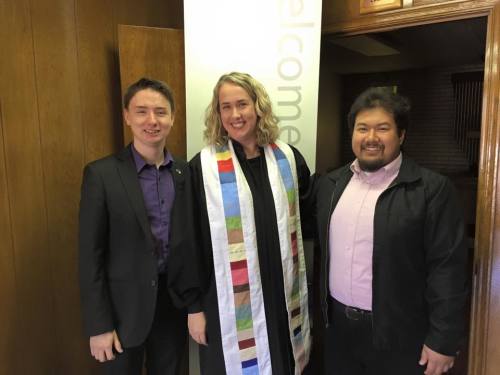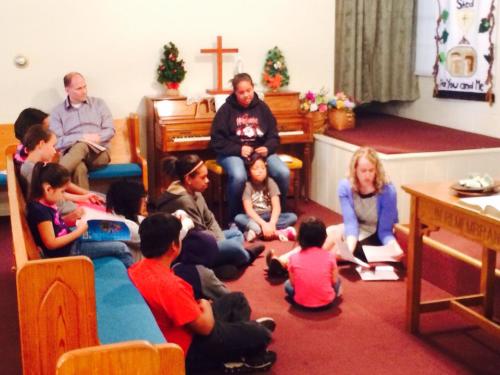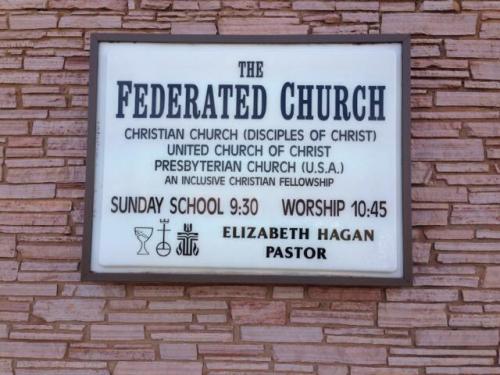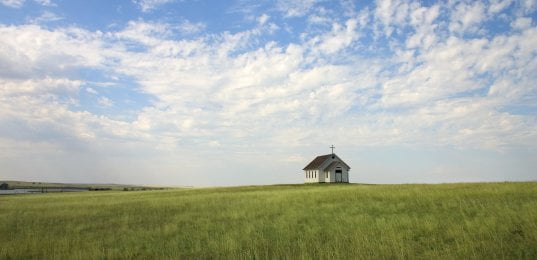How do I know what God wants me to do in _____ situation?
In my day job as a pastor, people ask me this a lot. I usually feel inadequate when asked (not because I'm not confident in my training as a minister to help people the best I can) but because what the person is asking is something I can't give in a fill-in the blank style of response.
To this question enter this week's word: discernment.
Discernment is defined as: the quality of being able to grasp or comprehend what is obscure.
We discern what might previously have seemed unattainable or unclear by a process of coming to know.
When I was a kid growing up in the church, I heard a lot about the actions of discernment such as reading scripture, praying, and being quiet in worship. I remember one Sunday School teacher telling me once that if we prayed long enough, we'd always know what God wanted us to do with our lives. For some maybe this is true.
But, as I’ve grown in faith, I’ve come to see a way of discernment isn't always about do this, then you'll get that. It’s actually much more messy.
Sometimes, actually often times, discernment for me looks like the simple practice of putting one step in front of another and seeing what comes. Sometimes it means you'll never get the answers to the big questions you're asking. Sometimes you do. Sometimes you don't.
Sometimes discernment comes through a word of a friend that we can’t seem to get out of our minds.
Sometimes discernment springs forward from an intuition that can’t be shaken, no matter what occurs.
Sometimes discernment comes as we stand still and see a life direction falling together in ways that we know we could never dream up or orchestrate on our own.
Discernment looks like me walking alongside you, you walking alongside me with open eyes, attentive feet and ears to hear the Great Mystery of: “This is the way, walk in it.” And then you know.
Maybe you know what you know forever. Or maybe it changes a week later.
I always try to remember one of my favorite prayers from Thomas Merton when he speaks to the fact that as much as we think we are doing God’s will, we may not be.
For, anytime we enter the deep waters of the big questions of our lives and of the universe, we must remember this: God is God and we are not. God's ways are not our ways. God's thoughts are not our thoughts.
But here's the grace-- God is with us as we go, as we sit, as we rest with uncertainty, as we figure stuff out in the middle of the night and in the daytime too. And so eventually we find our way. We do.
You are doing such brave work choosing a spiritual path. And I'm proud to be among you.
XO
Elizabeth
"Instructions for living a life. Pay attention. Be astonished. Tell about it." -Mary Oliver
 After I left my position as pastor in December of 2012 to follow Kevin to Oklahoma and his work with Feed the Children, I thought I might never hold an official position at a church again.
After I left my position as pastor in December of 2012 to follow Kevin to Oklahoma and his work with Feed the Children, I thought I might never hold an official position at a church again.
Much like I'd given up teaching elementary school after graduation from college, I thought maybe this "pastor thing" was over for Elizabeth Hagan.
During the previous four years I'd served as pastor of Washington Plaza Baptist in Virginia, I'd come to know a few things:
Why would I go back to an every week gig?
Maybe I was called to create a way of pastoring in the world that was altogether new? Especially as I found myself in a state where "my kind" of preaching (i.e. I was a woman) wasn't welcomed. It all seemed like a good decision.
Yet, I knew I'd always preach. I just figured I'd supply preach a lot for colleagues. And from January 2013- August 2014, this is what I did. I even found a lovely little Native American congregation in Watonga, OK that welcomed me almost every month to fill the pulpit.
I made peace (mostly) with my non-traditional status. I boasted in the prophetic possibilities of giving just one sermon in a congregation and then leaving. I used my free time to travel, "to feel like a normal person" who ate pancakes on Sunday mornings, and I wrote a lot. I even boldly blogged once that this preacher on the plaza life was who I was made to be!
But, then a weary season came on. Last Palm Sunday and Easter I sat in the pews for the second year in a row. I felt more than restless. My voice that once powerfully proclaimed truth now felt so shy. Being only "Kevin's wife" became a burden to big to bear. I started doubting I had anything to offer anyone.
Thanks be to God I didn't stay in this dark place. A few friends held me up until I had enough courage (or maybe desperation) to give Oklahoma another chance to surprise me.
Enter The Federated Church in Weatherford, OK into the story.
Six months ago, I accepted the position of interim pastor with them. And after a couple of weeks, I found myself in love all over again.
Standing the pulpit every Sunday morning felt like coming home.
Looking at dear ones in the eyes as I served them communion felt joyous.
Positioning myself between the children on the front steps of the church felt like a place I never left.
Even sitting in budget and church board meeting felt like returning to the zone for which I was made.
With astonishment, I learned this: I need the church. And the church needs me.
As much as I want to do church differently-- in a way that doesn't eat up all my time and emotional resources-- I realized that I can't leave altogether. Supply preaching is just not enough. I need to be in a church leading on a regular basis. Not only because it's what I have a degree and ordination status to do, but it is what God called me to do. To not serve the church, for me, is to miss out on the meaning of my life.
And as much as I want to say that the church must change and traditional structures are dead, they aren't. The church needs compassionate and thoughtful leaders that treat its congregation members with respect and dignity. The church needs leaders who can creativity imagine its new becoming even with all the changes in American religious life. I know I am a professional who can do this. I know I can love and serve a group of people well.
So, here I am telling you about it.
First of all so that you can give thanks to God with me for the hospitality and grace of The Federated Church for calling woman such as me into their pulpit and giving me this great gift!
And second so that you can hold me accountable for the seasons to come-- that Pastor Elizabeth is my name.
I need the church and the church needs me.
 As I'm getting back in the swing of the more structured pastoral life again, I am beginning to engage in conversations with folks that sound a lot like this:
As I'm getting back in the swing of the more structured pastoral life again, I am beginning to engage in conversations with folks that sound a lot like this:
"How do I know God's will for my life?" or "How can I know what God wants me to do?"
When I get asked questions like this, I usually feel inadequate (not because I didn't go to seminary or take lots of pastoral care classes) but because it is as if the questioner is asking me to play the role of God in their life, telling them what they are to do as they face difficult decisions.
At heart, I see the role of a pastor to be that like a spiritual director, an intentional relationship between a people and one called out to lead of figuring out what it means to find the presence of God in community. And so, as a pastor I still serve in the role of learner as much as I do a teacher. Thus, for me to give a specific answer to "This is what God wants from you" with complete authority can often be off base and misstated. One of my favorite prayers from Thomas Merton speaks of the fact that as much as we think we are doing God's will, we may not be.
So, if even pastor types can not speak definitively for God with absolute certainty, then how can we know? How can we discern God's steps for us when we reach junctures of big decisions?
I would have once answered this question by saying large amounts of time need to be offered up to God sitting quietly in the woods or taking residence in prayer closets. I would have said that if you diligently search the scriptures, an answer from the pages would come. Or, I would have said that if the decision leads to more folks coming to know of Christ, then of course it was the right one (can you tell I used to be an evangelical?).
But, as I've grown in faith, I've come to see a way of discernment that doesn't always have to include words shouted from the heavens with my name in them or having moments of great epiphany in prayer. It's actually much more messy than this. Sometimes as much as we think we know, we don't. My spiritual director always says meaning is revealed (to which I find frustrating of course).
So from my own experience (which again is just my own experience) this is what I know:
Sometimes, actually often times, discernment for me now looks like the simple practice of putting one step in front of another and seeing what comes. Knowing that as I go down a path, the Spirit can be trusted to show me where I am to be and where red flags are shouting "stay away, go the other direction."
Sometimes discernment comes in a word of a friend that I can't seem to get out of my mind.
Sometimes discernment comes as intuition that I believe from my heart that can't be shaken, no matter what occurs.
Sometimes discernment comes as pieces of a life direction falling together in ways that I know I could never dream up or orchestrate on my own even if I tried.
Though I am often not much help to those who come to me seeking "the answer" to their troubles, hopefully what I can do as a pastor, as a friend, as a wife is to listen, to say what I hear and hope for the Spirit to make clear what needs to rise up and what needs to fall away.
Because after all, this is what doing life together is at its best. For as much as I can be this for fellow travelers on the journey, I need the same folks to do this for me too.
Discernment then looks like me walking alongside you, you walking alongside me with open eyes, attentive feet and ears to hear "This is the way, walk in it."
Today our Pentecostal series continues with a guest post from Susan Smartt Cook. You may remember her wonderful prose from our Advent series last winter. Susan is a midwife, a wife, the mother to two fabulous dogs and a friend to many in Edmond, OK.
She blogs about the question, "What does living in the Spirit mean to me?" . . . words that I think will resonate with any of us who've waded through life's biggest questions.
Some call them signs, synchronicities, affirmations. Others say it’s just reading into things. I call it living in the Spirit. Opening my eyes. I love to notice what some would call coincidences, but what I call clear moments of truth.
It’s the Spirit of God whispering my all-time favorite verse, “Whether you turn to the right or to the left, your ears will hear a voice behind you saying, ‘This is the way; walk in it.’” (Isaiah 30:21). Pressure’s off!
Right OR left … just walk!
Pick up those feet and move. Show up, press on, step out. Life is scary. Changing is scary. Walking is scary. Considering the harsh negativity and pervasive your-annoying-if-you’re-inspired cynicism of this day and age, we have every reason to be spiritual couch potatoes, but the Spirit says WALK.
Several years ago I was on a study retreat in Idaho preparing for my national midwifery exam. I was daunted, paralyzed, COUCH potato-ed by the task. The exam, sure, it was gonna be long, but MIDWIFERY.
How dare I claim such a high calling in the world? How dare I fancy myself worthy of such sacred, special work?
I needed fresh air, so I went for a walk in the snow along a nearby stream.
On the way, I was feebly whining to God about my fear, my doubt, my stuck-ness.
And lo and behold if that very moment a bald eagle didn’t swoop low over my head, circle back over the water, snatch a fish, and soar away! It was stunning! Crisp winter air, snow capped mountains all around, and an eagle flying home. Many might consider that no more than a neat nature moment, but to me it was God. It was Spirit showing up, flying over, swooping down.
Why not infuse life with such meaning?
Why not find spirit among us every day, guiding us like a pillar in the wilderness or a bird in the sky?
Sometimes it feels more like a wink, and pat on the butt, “Go get um! Show ‘em whatcha got!” And sometimes it feels like the clouds roll back, the angels hit a high note, and God says “Hello, and YES!”
Yes to life, yes to me, yes to the right or to the left … choose a path, sister, and walk in it!
The particulars might change, but it’s the conviction, the force behind what we do that’s living in the Spirit. God is with us. It is so.
 I was taught in seminary that the most virtuous thing you can do for your whole life is to serve the church with an undivided heart. "The church needs you!" my classmates and I were told over and over again.
I was taught in seminary that the most virtuous thing you can do for your whole life is to serve the church with an undivided heart. "The church needs you!" my classmates and I were told over and over again.
Sometimes our instructions included more details like this: “Take care of the church like nothing else matters. Live in the community where you serve, join every local board you can, and know your neighbors. Those who give their whole life to the church will not be disappointed."
And I tried. I really tried to become the best local church pastor I could be. I attended neighborhood meetings. I sat at the bed of the sick. I climbed into the pulpit week after week. And for a while it was my calling.
I wanted to fit into the one-size fits all church box forever. I wanted to come back to my 30-year Duke Divinity School reunion and tell stories about the pastoral life just like I'd heard out of my beloved professor, Dr. William Quick.
But after six years in full-time church ministry I found that I could not-- even as much as my heart really wanted to. My time was up.
Walking away from what I once felt was my dream job (as a solo pastor in the Baptist tradition) last Christmas became one of the hardest decisions I ever had to make.
I heard recently that when newcomers ask the church I formerly pastored why I left they say that "She become a writer." While I’m flattered with being identified as a writer (and I love writing), this is not quite it.
Furthermore, the change had nothing to do with the lack of joy in little congregation as they were great people. Nor was it all about my husband’s job in another state. Or even about the grant I received from the Louisville Institute to write a book, though these reasons seemed like legitimate ones on the surface.
No, I left local church ministry last year because I was finally ready to say yes to a calling. I was ready to be a nobody (if that is what folks thought of me) in order to be the somebody that I really am.
Right now, I am following that calling (though the "what do you do?" questions at parties now are harder to answer).
In the world from which I came both as a child of a pastor and also of a local church pastor making seminary-- to leave the church for something else felt to me like treason.
But in the past several years, I come to believe that being a whole person is much more important than a respectable career even if you have to feel like an outcast upon leaving. I took some cues from Barbara Brown Taylor here.
And for me to be a whole person, this is what I know:
I am not made for a job or type of job that lasts me my entire career.
I am not made to immerse myself into a particular local church community for a long time.
I am not made to just do one thing all the time or even just one thing at once.
I am not made for denominational life or ministry that values institution building over freedom of the Spirit.
Yet, with all of this said, I am made however for bolts of energy into new projects that need a leader.
I am made for community building with the global church.
I am made to multi-task my way through a variety of vocational pursuits that often on the surface seem like they have nothing to do with each other, but actually do!
I am made to speak the truth about systems that are broken.
And in all of this, I still feel ordained. I've not stopped being Rev. Hagan. I still feel like I’m in ministry.
I’m a writer sometimes.
I find myself in pastoral care conversation sometimes.
I’m a preacher sometimes.
I’m a strategist for creating community both in person and online sometimes.
I’m an administrator sometimes.
I do the laundry all the time. And I make dinner most of the time.
I'm thankful for the chance to do all of this "outside the church" but never too far from its larger mission.
And it fits. It really fits. The restless whispers of my heart have stopped yelling at me. I'm finally at home.
I feel settled even as pace of our current travels and activities make my family’s head spin when I inform them what I'm up to.
In this non-traditional life, I am happy. Truly I am.
I love supporting the communications department of Feed The Children. I love writing in a variety of different venues. I love having quality time for friends. I love traveling alongside my husband. I love preaching in settings (like next week in Hawaii!) that a local church schedule would normally not allow. I love that I have the freedom to find God both in and outside the church walls on Sunday morning-- depending on the week.
Lesson learned: when the whispers come, listen. I’m so glad I did. I hope I have the courage listen sooner next time. It’s ok to be different. Actually it is really wonderful even if some of my friends in the church don't understand.
 It is a popular question to ask pastors or religious leaders in general: "How do I know God's will for my life?" or "How can I know what God wants me to do?" Just as folks go to the doctor to figure out what is wrong with them when they are sick, it's pastors that suddenly get so popular when life's confusing crossroads hit.
It is a popular question to ask pastors or religious leaders in general: "How do I know God's will for my life?" or "How can I know what God wants me to do?" Just as folks go to the doctor to figure out what is wrong with them when they are sick, it's pastors that suddenly get so popular when life's confusing crossroads hit.
For me, when I get asked questions like this, I usually feel inadequate (not because I didn't go to seminary or take lots of pastoral care classes) but because it is as if the questioner is asking me to play the role of God in their life, telling them what they are to do as they face difficult decisions.
At heart, I see the role of a pastor to be that like a spiritual director, but even a deeper relationship than that a counselor has with their clients: an intentional relationship between a people and one called out to lead of figuring out what it means to find the presence of God in community. And so, the pastor still serves in the role of learner as much as he or she does as teacher. Thus, for any pastor to give a specific answer to "This is what God wants from you" with complete authority can often be off base and misstated. One of my favorite prayers from Thomas Merton speaks of the fact that as much as we think we are doing God's will, we may not be.
So, if even pastor types can not speak definitively for God with absolute certainty, then how can we know? How can we discern God's steps for us when we reach junctures of big decisions?
I would have once answered this question by saying large amounts of time need to be offered up to God sitting quietly in the woods or taking residence in prayer closets. I would have said that if you diligently search the scriptures, an answer from the pages would come. Or, I would have said that if the decision leads to more folks coming to know of Christ, then of course it was the right one (can you tell I used to be an evangelical?).
But, as I've grown in faith, I've come to see a way of discernment that doesn't always have to include words shouted from the heavens with my name in them or having moments of great epiphany in prayer. It's actually much more messy than this. Sometimes as much as we think we know, we don't. My spiritual director always says meaning is revealed (to which I find frustrating of course).
Sometimes, actually often times, discernment for me now looks like the simple practice of putting one step in front of another and seeing what comes. Knowing that as I go down a path, the Spirit can be trusted to show me where I am to be and where red flags are shouting "stay away, go the other direction."
Sometimes discernment comes in a word of a friend that I can't seem to get out of my mind.
Sometimes discernment comes as intuition that I believe from my heart that can't be shaken, no matter what occurs.
Sometimes discernment comes as pieces of a life direction falling together in ways that I know I could never dream up or orchestrate on my own even if I tried.
Though I am often not much help to those who come to me seeking "the answer" to their troubles, hopefully what I can do as a pastor, as a friend, as a wife is to listen, to say what I hear and hope for the Spirit to make clear what needs to rise up and what needs to fall away. Because after all, this is what faith community is at its best. For as much as I can be this for fellow travelers on the journey, I need the same folks to do this for me too.
What does discernment look like? It looks like me walking alongside you, you walking alongside me with open eyes, attentive feet and ears to hear "This is the way, walk in it."